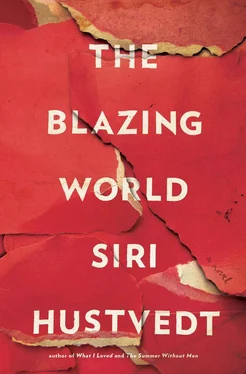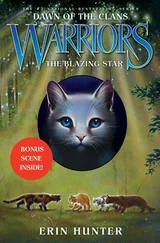What had they talked about? In the cab on the way back to the lodge, Harry said their big subject had been Bill Wechsler. Harry loved Wechsler’s work. She counted him as an influence, although he was born after her. He had died suddenly a few months earlier. I remember she held my hand in the taxi and kissed it several times in a fit of sudden affection, saying, “Dear, dear Phinny.” Then, after we got home, we lounged about with a cognac, getting tipsy. Harry confided she found Rune’s crosses boring, but she liked some of his earlier works, the plastic-surgery screens, which were genuinely creepy. Maybe she’d buy one — a good investment. If it didn’t hold up, she could always turn around and sell it to some hungry collector eager for the name.
After bussing me in the taxi, Harry turned prickly, irritable, and sour. She had drunk too much, and I could feel the self-pity mounting as she rolled off the names of women artists suppressed, dismissed, or forgotten. She jumped up from the sofa and stomped back and forth across the room. Artemisia Gentileschi, treated with contempt by posterity, her best work attributed to her father. Judith Leyster, admired in her day, then erased. Her work handed over to Frans Hals. Camille Claudel’s reputation swallowed whole by Rodin’s. Dora Maar’s big mistake: She screwed Picasso, a fact that had obliterated her brilliant Surrealist photographs. Fathers, teachers, and lovers suffocate women’s reputations. These are three I remember. Harry had an endless supply. “With women,” Harry said, “it’s always personal, love and muck, whom they fuck.” And a favorite theme of Harry’s, women treated like children by paternal critics, who refer to them by their first names: Artemisia, Judith, Camille, Dora.
I crossed my legs, looked askance at Harry, and began to whistle. It was not the first time I had taken this approach. “I am not the enemy,” I said. “Remember me, Mr. Feminist Phineas Q., your friend and ally, black gay man or gay black man with slave ancestors, hence original name, Whittier? You may recall that black people were both feminized and infantilized by racism, dark bodies and dark continents, honey child. Seventy-year-old men were called boys by twenty-year-old white ladies .”
Harry sat down. Whistling, along with a few caustic verbal darts, usually brought her up short. She gave me that oh-Phinny-I’ve-gotten-carried-away-and-am-embarrassed-but-still-fiercely-attached-to-my-opinion look. Much later, I looked back at the evening and saw further ironies. If Harry knew that art history had steadily sunk the reputations of women artists by assigning their work to the dad, the husband, or the mentor, then she should have known that borrowing a big name like Rune might sting her in the end. And yet, what Harry took for granted was that she moved as a collector in circles where money and celebrity mingled, white circles with the rare black and brown face. I know because I had been that face.
Rune was smart, and he was gifted, but I doubt anyone can actually separate talent from reputation when it comes down to it. Celebrity works its own miracle, and after a while it lights up the art. I am curious about the man’s death, but I suspect he was one of those people who could never feel enough, and as time went on he had to push himself to further extremes to get any kind of a rush from life. I don’t really know what happened between him and Harry. I know she cared about him. I know he fascinated her. But I had fallen for Marcelo and moved away by the time it went wrong. All the gossip, all the lying and posturing billowing up like smoke around the whole story, have made me bilious. There was plenty of pain to go around.
A small plastic-surgery work popped up at the lodge a couple of months later. Most of “the collection” Felix Lord had accumulated was in storage, but she had Rune’s screen mounted on the wall upstairs, and we could all watch the artist’s little film: The New Me . It began with multiple versions of “before and after” ads, including the old drawings of a scrawny wimp on the beach transformed into a muscleman. We saw the fat, sagging, lumpy, and drooping metamorphosed into the slender, tight, smooth, and lifted. Rune, however, included “during” as well — films from facial surgery with blood-soaked gauze, knives slicing cheeks, skin flayed open, as well as flashes from an instructional video in which a row of practicing physicians bent over heads that had been severed from cadavers. The movie had a music video feel to it but played in silence, with fast cuts, clever edits that juxtaposed gore and loveliness. After about five minutes, the transformations became fantastical, a visual science fiction journey with animated bits of molded, airbrushed, robotic body-beautifuls. Rune himself was all over it in brief stills, close-ups, and long shots, some flattering, some not.
I liked it.
When Ethan saw it, he told to his mother that the work was a side effect of celebrity culture. He called it “life in the third person,” a phrase I liked. He said that’s what people want, to lose their insides and become pure surfaces. He told Harry she had wasted her money. She could have written out a check for the homeless. (We could always give it to the homeless or the environment or disease research.) Harry defended Rune. Ethan called it a pandering piece of shit for the stupid class. He didn’t raise his voice, but he argued steadily. He reminded me of my hero Levolor, that pious adolescent crusader, bumping along on his high horse. Ethan’s brand of Puritanism had a left-wing coloring, but that didn’t soften it any. Harry muttered that it was all right for the two of them to disagree, but her voice had turned husky. She reached out for him with her long fingers, but hesitated when they neared his shoulders. He stepped backward and blurted out, “Felix would have hated it.”
Harry flinched. Then she closed her eyes, inhaled loudly through her nose, and her mouth stretched flat and tight in preparation for tears, which did not come. She nodded as she tried to hold her face still. She put her fingers to her mouth and just kept nodding. I wanted to vanish in a puff of purple smoke. Ethan had a paralyzed look about him. Say something, I thought, come on, say something. He was speechless, but he flushed to his ears, and his eyes had lost their focus. Soon after, Ethan left, and Harry sequestered herself in the studio. The scene had made me sad, and I knew I would be on my way before too long. The lodge was transitional, a temporary hideout, one of the strange turns in a strange life.
There is one other story I have to tell. There are times when I’ve thought to myself, Phinny, you must have dreamed it, but I didn’t. One night, I came home from the club. It was about five in the morning, maybe a little later. The night was cold, and before I went inside, I stood by the water and looked up at a skinny little moon with some thin clouds over it. When I walked into the hallway, I immediately knew something was wrong. I heard a retching sound, a cry, then loud cracks and thuds. The acoustics were strange in that building and tracing noises wasn’t easy. I checked on the Barometer, but he was in his sleeping bag. Burglars are quiet, I thought. I heard gasps, more choking sounds. They’re coming from Harry’s studio, I thought. I rushed to the door, opened it, and at the far end of the room, about twenty-five yards away, I saw Harry kneeling on the floor. She had a big kitchen cleaver in her fist and was ripping open one of her metamorphs. I couldn’t tell which one. The huge space was dark except for a single light that shone down on her. She didn’t hear me, because she groaned each time she thrust the knife into the padded body. There were also broken fragments of wood around her, and I guessed she had torn apart one of her little rooms or boxes.
Читать дальше












